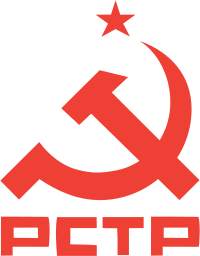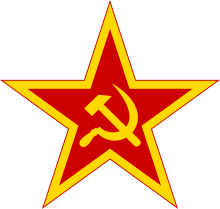Portuguese Workers' Communist Party
Portuguese Workers' Communist Party/Re-Organized Movement of the Party of the Proletariat Partido Comunista dos Trabalhadores Portugueses/Movimento Reorganizativo do Partido do Proletariado | |
|---|---|
 | |
| Leader | Unknown |
| Founded | 1970 |
| Headquarters | Lisbon, Portugal |
| Youth wing | Formerly the Marxist–Leninist Students Federation, now non-existent. |
| Ideology |
Communism Marxism-Leninism Maoism Anti-revisionism |
| Political position | Far-left |
| International affiliation | None |
| Colors | Red |
| Assembly of the Republic |
0 / 230
|
| European Parliament |
0 / 21
|
| Regional parliaments |
0 / 104
|
| Local Government |
0 / 2,086
|
| Website | |
| http://www.pctpmrpp.org | |
| Part of a series on |
| Maoism |
|---|
|
The Portuguese Workers' Communist Party/Re-Organized Movement of the Party of the Proletariat (Portuguese: Partido Comunista dos Trabalhadores Portugueses/Movimento Reorganizativo do Partido do Proletariado, PCTP/MRPP)[1] is a Maoist political party in Portugal.
History and overview
The party was founded in 1970.[2] On the ballot, its name appears as the Portuguese Workers' Communist Party, omitting the "Re-Organized" part of the name; however, its acronym remains unchanged. Its first secretary-general was Arnaldo Matos.
Originally called merely the MRPP, the party's political orientation has been Maoist since its foundation. In 1971, still during the conservative and authoritarian dictatorship led by Marcello Caetano, the party began issuing a newspaper called Luta Popular (People's Struggle). The party was among the most active resistance movements before the Portuguese democratic revolution of 1974, especially among students of Lisbon. After the revolution, the MRPP achieved fame for its large and highly artistic mural paintings. It was intensely active during 1974 and 1975. At that time, the party had members that later came to be very important in national politics, for example, José Manuel Durão Barroso and Fernando Rosas, who subsequently left the party. The party, however, never managed to elect a single MP in legislative elections.
During the revolutionary period of 1974 and 1975, the MRPP was accused (mainly by the Portuguese Communist Party) of being an agent of the CIA - a belief that was fueled by the co-operation between the MRPP and the Socialist Party against the communist program defended by the Portuguese Communist Party.
In 1976, the party changed its name to the Portuguese Workers' Communist Party, and it was then that it started to use the acronym PCTP/MRPP. Its historical leaders are Arnaldo de Matos and Saldanha Sanches. The latter directed the Luta Popular newspaper.
The party's youth wing, now extinct, was the Marxist–Leninist Students Federation, to which José Manuel Durão Barroso also belonged.
The party entered a phase of internal turmoil following the 2015 legislative election, with its leader and most known figure, António Garcia Pereira, leaving the party. Details about the internal functioning of the party became difficult to obtain, since none of the official contacts is answered, and even the official headquarters seem to no longer be functioning. An extraordinary congress was announced, but it is unknown if it really happened, and if so, when and where. Some sources have stated the party is now operating at a clandestine level.
Election results
Assembly of the Republic
| Election | # of votes | % of vote | # of seats | Place |
|---|---|---|---|---|
| 1976 | ||||
| 1979 | ||||
| 1980 | ||||
| 1983 | ||||
| 1985 | ||||
| 1987 | ||||
| 1991 | ||||
| 1995 | ||||
| 1999 | ||||
| 2002 | ||||
| 2005 | ||||
| 2009 | ||||
| 2011 | ||||
| 2015 |
European Parliament
| Election | # of votes | % of vote | # of seats | Place |
|---|---|---|---|---|
| 1987 | ||||
| 1989 | ||||
| 1994 | ||||
| 1999 | ||||
| 2004 | ||||
| 2009 | ||||
| 2014 |
See also
References
- ↑ It is pronounced [pɐɾˈtidu kumuˈniʃtɐ duʃ tɾɐbɐʎɐˈdoɾɨʃ puɾtuˈɡezɨʃ / muviˈmẽtu ʁiɔɾɡɐnizɐˈtivu du pɐɾˈtidu du pɾulɨtɐɾiˈadu].
- ↑ "Political Parties in Portugal". Translation Company Group. Retrieved 15 June 2016.
External links
- Homepage of PCTP/MRPP (in Portuguese)
